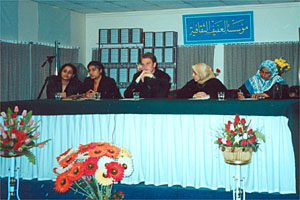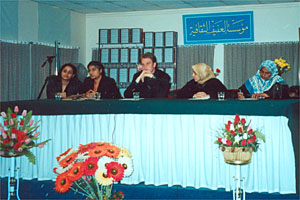
Women Prisoners’ Conditions Reviewed [Archives:2001/08/Culture]
February 19 2001
Tawfeek al-Sharaabi
Yemen Times

The first meeting focused on women behind bars in the world in general and in Yemen in particular. The meeting was quite informative and enlightening as many creditable papers were presented. There were also many valuable interpositions and questions which enriched the deliberations with actual happenings from inside the Yemeni society.
The al-Afif Young Girl Forum, consists of Ibtehal al-Dula’ee, Belqis al-Lahabi and Zaidah Shibam, the working team of the program, who exerted commendable efforts to make the program a success.
Belqis al-Lahabi said “At first the whole program was conceived as an idea to hold two or three discussion meetings in one month. However, as we reflected at length on it, it became bigger and bigger. It was like a snow-ball that gains momentum and becomes bigger the more it rolls down. We felt encouraged to do something for Yemeni women as this is the Year of Arab Women which was announced at a conference that was held in Egypt. We talked to many women, many organizations and got a clear vision of what we are going to do. At the end of these meetings I’m pinning high hopes on doing something for Yemeni women in general and women prisoners in particular.”In his paper, Mr. Stefan Schwarz, representing the International Committee of the Red Cross (ICRC) and person in charge of visiting prisons said “The ICRC has certain principles that are followed in all the countries of the world. We visit prisons, talk with prisoners and then we talk with prisons’ officials so as to find solutions for prisoners’ problems. After paying visits to prisons, the committee present a report to the authorities concerned so as to improve conditions inside the prisons. It has been a firm stand and basic principle of the committee not to report about what we see but about what we did. This will help us a lot to help the prisoners.”Mr. Stefan laid strong emphasis on many social problems that have a negative effect on Yemeni women prisoners. He said ” These social problems outside have a strong negative effect on their conditions inside. Most women prisoners are convicted of immoral crimes which lead them to face a more hazardous situation. By and large, they are no longer accepted in society. This makes them feel that they are forgotten, which may have harmful psychological effect.
Being completely isolated from their families outside and due to limited medical facilities in Yemen, women in prison also face medical problems. Some of them give birth to children who become isolated and disintegrated from the society just like their mothers. This is not just. They have committed no crime and still they are oppressed and isolated.”
He pointed out a new program the ICRC is working on to improve the conditions of women prisoners and improve their financial and moral situation. He said “I believe that the greatest thing to do for these women is to maintain their contact with the outside world. We want other women to make at least one visit per month for every Yemeni woman prisoner. Women from the Red Crescent or National Women Committee or from any humanitarian organization can do this. This will help improve their psychological situation as they won’t feel isolated. If women visiting these prisoners come to reflect their conditions to the people, the picture will be clearer and the people will organize more assistance and help for them and for those who leave prison. Women visiting these prisoners could also help teaching them any crafts such as sewing, reading, etc. This will stand them in better stead and give them a push to start a new life after leaving prison. So jail period can be properly used to prepare them for the period after leaving prison.
The first project of the ICRC will be launched this month in Mahweet. The committee will provide women prisoners with some sewing machines. Volunteers from the local Red Crescent will visit the prisoners on a regular basis. They will also teach them sewing. The ICRC will also provide some extra sewing machines as gifts for those finishing serving their tail terms.”
Mr. Stefan said that the project was an experimental one in Mahweet and would be applied in all the prisons of the Republic. He encouraged other organizations to join hands and collaborate in serving this noble purpose.
Mrs. Nadiah Ali, lawyer, presented a paper pointing out reasons behind the lack of social studies and research on women prisoners, reasons behind women becoming involved in the field of crime. She said “The reasons behind that are many, however the most outstanding is the framework of Yemeni society and the conventions, social customs and norms.”Mrs. Nadiah asserted that this situation is in urgent need of serious consideration, especially as there have been great social, economic changes within the country in which women are a major part.
The society still does not look at women from the traditional angle. Yemeni society cannot understand or envisage that women can take to violence as men do. As a result they have an antagonistic stand against them.
The phenomenon of women prisoners is worth consideration and research as the woman is the main block of the family. When a woman is in prison the whole family is certain to suffer and this will upset the social balance of the whole society.”
In her paper, Mrs. Nadiah indicated that the Reformatory has failed to achieve and fulfill the reason behind it’s establishment, to train and re-qualify them psychologically and technically.
“Some women are charged with being alone with other men. After some time these women are sent to prison alone while men are left free. Besides, this has no legal background and there is no reference to this in the Criminal and Procedure Law.
The passive attitude of officials towards women when they are suspected of any crime makes them come up with biased and unjust decisions. Besides, when there is no legal background they depend upon their jurisprudence so as to settle the case. This is wrong and is not at all legal.
Sometimes we come to find that the two parents are sentenced to prison at the same time. So they are locked in two separate prisons, despite the fact that this goes in contradiction to the Criminal and Procedure Law. As a result the children come to find themselves with their mother inside prison.
Detention Pending Investigations are also set up to keep those suspected of any crime until he is convicted or acquitted of the charge. This is only applied for men . So women are convicted from the first time they enter jail. ”
In the meeting Mrs. Sameena A. Nazir, coordinator of women’s Rights Advocacy Program in the International Human Rights Law Group, also talked about a project that is to be launched in Yemen to support women’s rights. The project will be in collaboration with the Sisters Arabic Forum.
Fawziah Hassan, a lieutenant and in charge of women’s prison in Sana’a asserted that no violations of women’s human rights are taking place inside the prison. She also noted that their number is not much less that what it was reported to be, and that is 1000 women prisoners.
The meeting was enriched by many interposition and questions from attendants and media people who focused on many issues of great importance.
——
[archive-e:08-v:2001-y:2001-d:2001-02-19-p:./2001/iss08/culture.htm]


